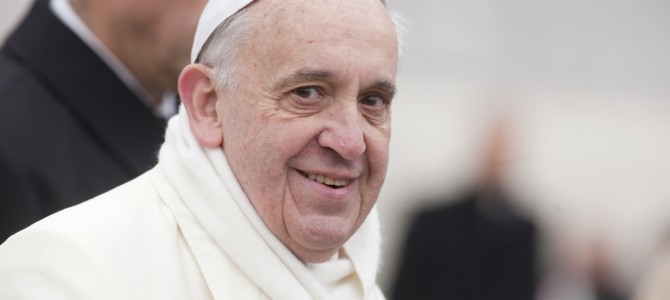
“Peronism may be a good example of the high cost of social reform when it is indulged in a rhetorical and at times high-handed and arbitrary way.”— Guido Di Tella, “Perón-Perón 1973-1976.”
Even now, the ghost of Perón roams Argentina. President Cristina Kirchner belongs to the Justicialist Party, founded in 1947 by Juan and Eva Perón. Our own president is an admirer of Kirchner and her brand of corporate statism tinged with anti-Americanism. Yet Americans have little interest in the Peronato or its continuing echo.
On the eve of a papal visit and descent on Congress, Americans—Catholics in particular—have an obligation to learn the contours of the political climate that shaped Pope Francis. As the veils drop from this pontificate, it looks increasingly like the Second Coming of peronismo. Whatever varietal name you choose for it, populist leftism is experiencing a rebirth, with the Vicar of Christ as an attendant midwife.
‘A New Communist and Papist International’ Order
The mainstream press has begun to notice, although it puts a smile on the apparition. In a July article entitled “The Peronist Pope,” The Economist was sanguine: “Rather than embracing liberation theology, he [Francis] is reinterpreting it for a post-Marxist age.” Post-Marxist? On some other planet, perhaps, but not on one hosting despotic regimes that elicit greater sympathy from a caudillo-friendly pope than democratic Israel.
Sandro Magister caught the tenor of things better than did The Economist: “The pope’s utopia is more Argentine than postmarxian.” His August 12 comment for Chiesa on Argentina’s recent presidential primaries, “From Perón to Bergolio,” had this as its lede:
The presidential election in Argentina is drawing attention back to the political vision of Pope Francis. His enthusiasm for the ‘popular movements.’ The utopia of a new communist and ‘papist’ International.
That last phrase refers to a March 13 rally organized by the Argentine minister of culture in Buenos Aires. The star participants were liberation- theologian-turned-Gaia-lover Leonardo Boff, Archbishop Sorondo of the Pontifical Academy of Sciences, and Gianni Vattimo, a postmodern Marxoid philosopher and anti-Zionist cheerleader for Hamas. Magister describes the scene:
To great applause and with a satisfied Sánchez Sorondo beside him, Vattimo made the case for a new communist and ‘papist’ International [sic], with Francis as its undisputed leader, the only one capable of leading a political, cultural, and religious revolution against the excessive power of money, in the ‘civil war’ underway in the world that – he said – is disguised as a fight against terrorism but is in reality the class conflict of the 21st century against the multitude of all the opponents of capitalism.
Shielding Autocrats’ Contributions to Poverty
An August 12 op-ed by Argentine journalist Uki Goñi in The New York Times referenced the earlier Economist article. Goñi is known at home for his 2002 documentation of the Vatican’s role in shepherding Nazis and Italian fascists to a post-war welcome by Perón’s Argentina. Recently he has come under fire for giving voice to skeptics of Francis’s actions in the Dirty War when he was archbishop in Buenos Aires. Yet the writer brings a striking insouciance to this latest coverage of Francis. In “The Peronist Roots of Pope Francis’ Politics,” he writes: “Pope Francis, who firmly disapproved of armed resistance, was not at first a supporter of liberation theology. But his thinking evolved.”
He lets drop a quote from Francis in Paraguay, instructing audiences “not to yield to an economic model which is idolatrous, which needs to sacrifice human lives on the altar of money and profit.” The words are meant to inflame, not inform. They are an incitement to rage in search of an object. To what end demagogic rhetoric from the Successor of Peter?
The op-ed does not ask. It closes with boilerplate affirmation of Francis’ Christian and humanistic values. Goñi makes no attempt to reconcile those values with the Paraguay quote which annuls them.
Following The Economist’s lead, Goñi glides on to assert that, today, the Catholic Church in South America is not threatened by Marxism but by evangelical Protestantism. In other words, the pope is engaged in nothing more than denominational competition for a wavering demographic. It is a misleading deflection from Francis’ myopia regarding the part autocratic regimes play in Latin America’s difficulties.
Modeled After Mussolini’s Facism
Francis is attracted to state dominion and the economic populism that serves as rehearsal for it. His inclination points down a crooked historical road, past Juan Perón and the Argentine Church, to the disfiguring alliance between Mussolini and Pius XI. Perón was an attentive student of Italian fascism and the role of the state in structuring an economy. He studied Mussolini’s opportunistic courting of the Catholic Church, which lent legitimacy to Il Duce in exchange for institutional privileges.
Perón particularly admired Mussolini’s oratorical hold on the populace. Both Juan and Eva understood the enchantments of populism. A charismatic pair, they ruled more by dint of personality—personalismo—than democratic procedure. Ushers of an “option for the poor,” they glorified the lower classes and denigrated the wealthy. (This, while they amassed a huge personal fortune from the Eva Perón Welfare Foundation.)
When Francis speaks of “the people” as a revolutionary vanguard that “overflows the logical procedures of formal democracy,” he is lapsing toward that ecstatic Peronist vision of a Third Way—justicialismo. That the disposition and design of it ended in economic collapse and misery is nothing against the splendor of the mystique.
In his youth, Francis absorbed the myth but not its lessons. Chief among them is how much Argentina’s fiscal catastrophe owed to an extravagant welfare system that favored enforced wealth redistribution over development. Among the many factors of Argentina’s historic economic crisis, one cries for attention: Perón’s increasing reliance on redistributing income, not only between industries and occupations but between skilled and unskilled workers.
Redistributing Wealth Destroys It
Narrowing wage differences between productive and non-productive segments of the economy proved lethal to the economic growth needed to achieve a durable prosperity. Beneficial to workers in the short term, Perón’s neglect of productivity—the engine of income creation—undermined possibilities for the long term. Eventually, popular expectations outran the money supply. The rest is ruin.
What Perón attempted in Argentina, Francis would effect globally with the aid of the United Nations and whatever “world authority” with enforcement powers can be conjured into existence. Climate change is the vehicle for what Vatican sweetheart Naomi Klein crowed was essentially an assault on democratic free enterprise and entrepreneurial culture. (“It’s not about carbon—it’s about capitalism.”)
Frank H. Knight, a founder of the Chicago school of economics, was a strong critic of societal and economic schemes endorsed by religious authorities with inadequate—or nil—comprehension of market mechanics. What he wrote in 1945 deserves attention still: “The consequences of action, grounded in romantic impulse, however well meaning, will usually be the opposite of what is intended or will entail new evils indubitably worse.”
The gospels do not provide economic or political revelation. Christianity offers no syllabus for monetary, industrial, or trade policy. Papal encyclicals are not blueprints for eradicating poverty. They provide no practical means by which fine ideals and morally satisfying solutions to hard problems are best achieved. Papal utterances can even hinder effective discussion. History testifies that the language of justice, delivered with divine sanction, can serve tyranny and disintegration as easily as it gratifies popular emotion.









